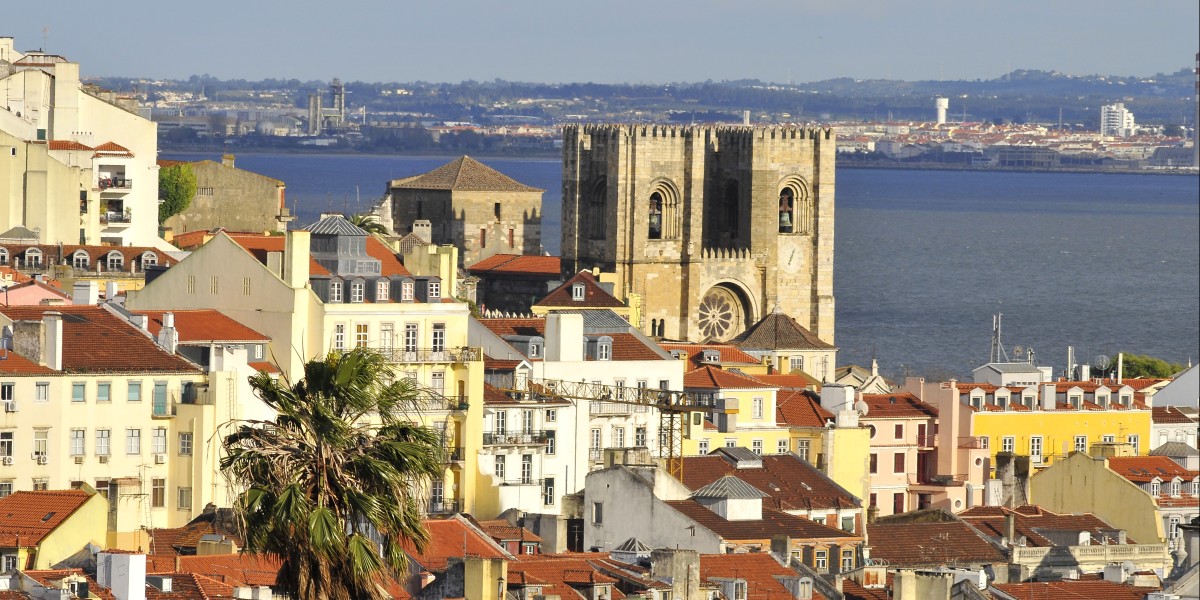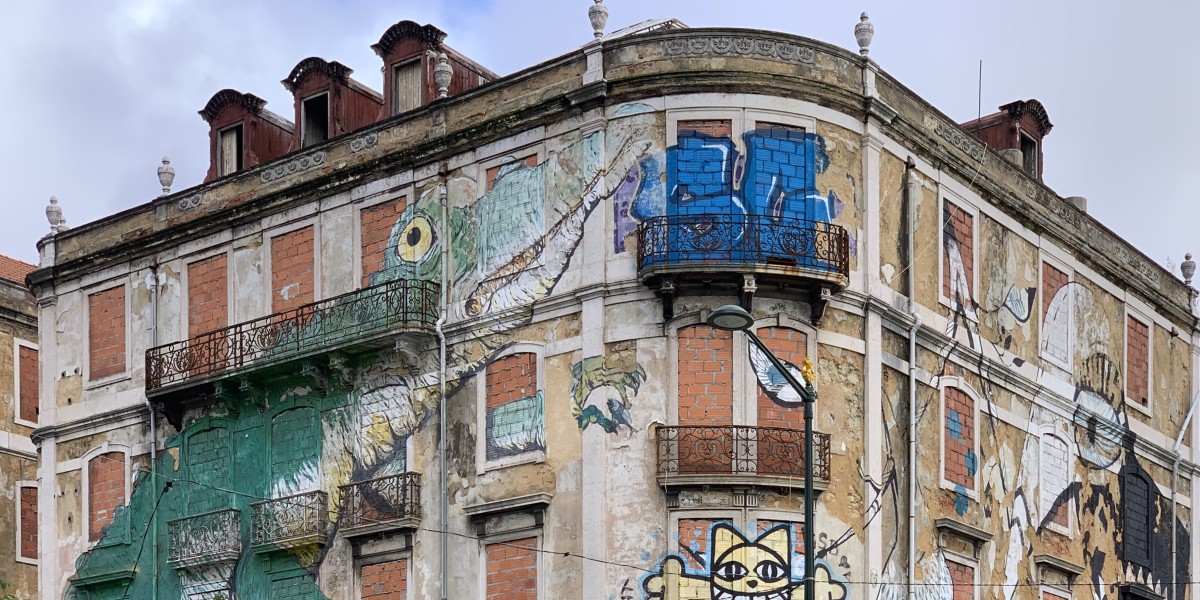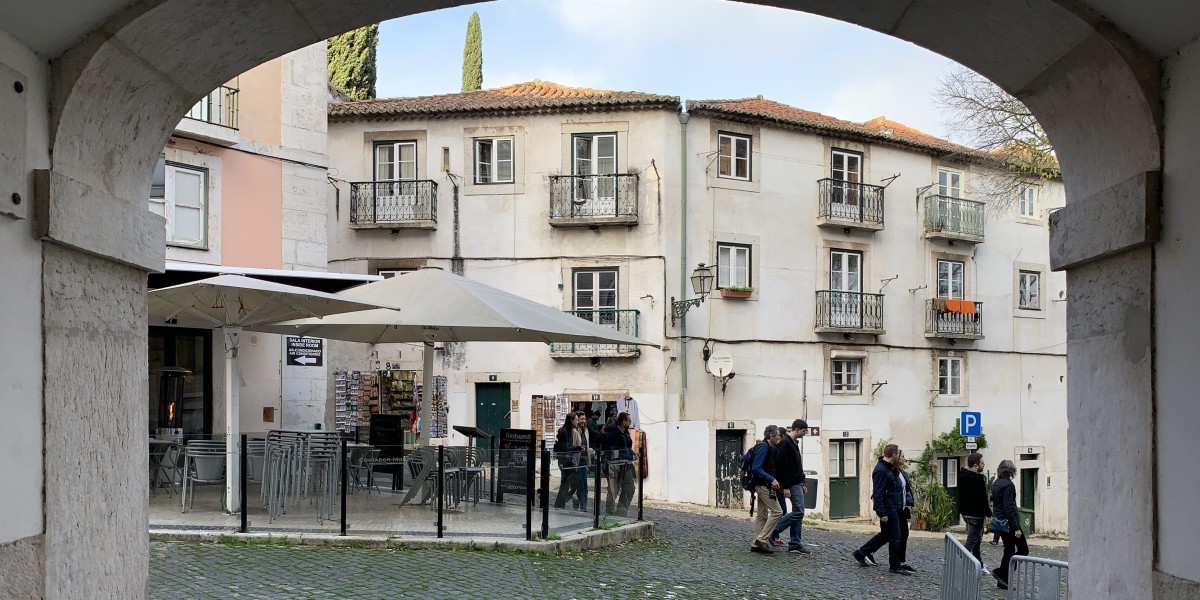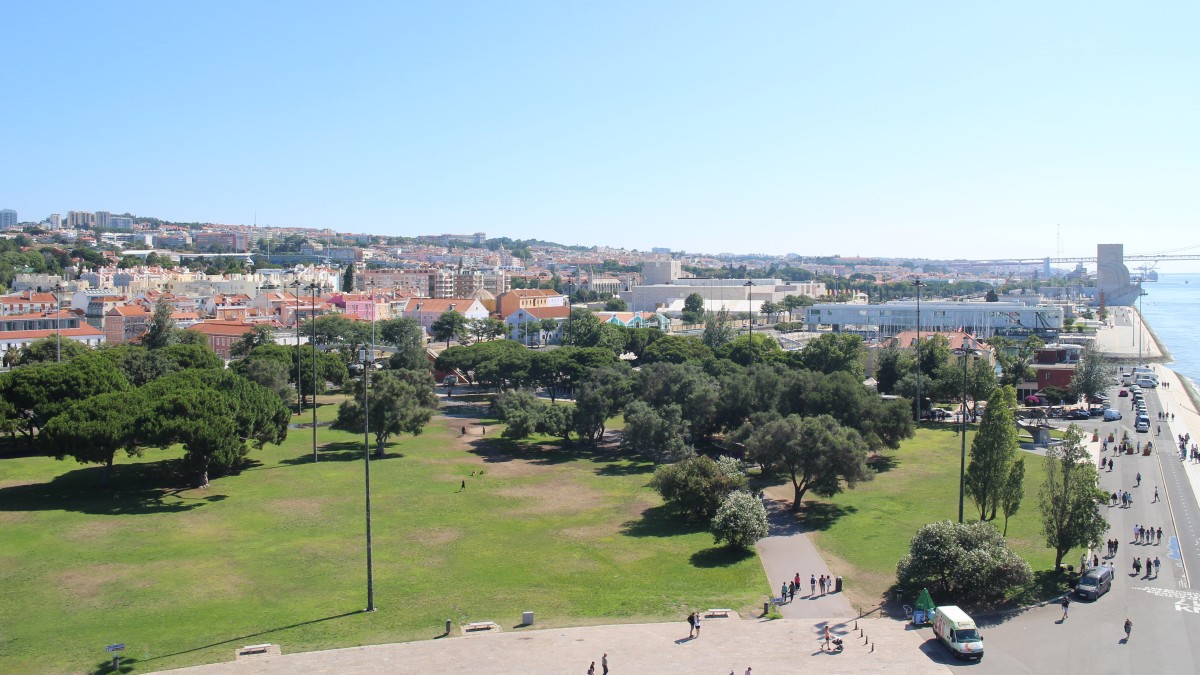
Lisbon’s magic hides in its bairros; for secret places in Lisbon, it’s the backstreets and hilltops where everyday life hums. Stumble across pocket miradouros, shrine‑tucked alleys and family‑run tascas.
The focus here is on non-touristy things to do in Lisbon. Calm gardens, riverside paths and mid‑century arcades are often at their quietest early or during the post‑lunch lull when visitors have had their fair share of tasty, typical Lisbon grub.
- Mouraria and Graça: street culture, viewpoints and old‑school eats
- Marvila and Beato: warehouses, craft breweries and riverside paths
- Alcântara and Ajuda: gardens, ateliers and calm river walks
- Campo de Ourique and Estrela: market life and leafy pauses
- Benfica and Carnide: markets, parks and budget‑friendly bites
- Belém beyond the monuments: hidden cloisters and backstreet cafés
- Alvalade and Areeiro: mid‑century gems and bookish stops
- Visiting or moving to Lisbon
Mouraria and Graça: street culture, viewpoints and old‑school eats
Mouraria and Graça cling to the hillside above Martim Moniz, where some of Lisbon's best live fado shows echo on stairways and grandmas sweep the doorstep at dawn. Expect azulejo‑lined lanes, tiny shrines, and a lived‑in rhythm that feels miles from the centre despite being a short climb away.

Quiet highlights
•Vila Berta in Graça shows off an early‑20th‑century courtyard street, with Art Nouveau tiled façades and low stoops that invite a slow wander.
• The upper terraces of Jardim da Cerca da Graça create a calm pause under olive trees, and the back gate onto Calçada do Monte gives a discreet exit.
• Escadinhas de São Cristóvão in Mouraria delivers a fado mural that rewards an early visit before the city stirs.
• Casa da Achada – Centro Mário Dionísio runs small exhibitions around a quiet patio that feels a world away.
• Rua do Capelão lines up fado plaques and wall shrines that trace local history in miniature.
Bites and sips
• Zé da Mouraria serves grilled fish and bifinhos at sensible prices, and the bustle stays friendly at lunch.
• Café da Garagem inside Teatro Taborda pours a thoughtful coffee with broad city views through the window.
Best time to go
Early mornings or late afternoons on weekdays help avoid the Tram 28 swell through Graça.
Marvila and Beato: warehouses, craft breweries and riverside paths
Out east, Marvila and Beato trade hills for long, low warehouses, splashes of street art and the soft clink of glasses in taprooms. The mood is creative and unhurried, with broad blocks that suit lingering between galleries and cafés.

Quiet highlights
• Underdogs Gallery anchors a pocket of murals on Rua Fernando Palha and Rua do Açúcar that repays a slow loop.
• Fábrica do Braço de Prata turns a former factory into a bookish arts space with tucked‑away rooms for reading and music.
• Hub Criativo do Beato threads studios and patios together and works well for a gentle nosy around.
• The Ribeirinho Oriente path offers long, breezy riverside walks away from central crowds.
Bites and sips
• Dois Corvos pours small‑batch beers in a cosy taproom that feels welcoming even on quieter weekdays.
Best time to go
Late Friday and weekend afternoons bring open doors and a river breeze, while weekdays feel quieter.
Alcântara and Ajuda: gardens, ateliers and calm river walks
Between the bridge and the palace hill, Alcântara and Ajuda mix docklands with green pockets. LX Factory can draw a crowd, but the uphill gardens and the long, flat riverfront still leave space for a slower day.

Quiet highlights
• Jardim Botânico da Ajuda lays out terraced parterres where peacocks wander between citrus and shade.
• Tapada da Ajuda hides woodland paths and viewpoints that glance over the bridge and the Tejo.
• Museu do Oriente sits by the docks and usually stays serene outside exhibition openings.
• Village Underground Lisboa stacks buses and containers into a photogenic nook that feels calm first thing.
Bites and sips
• Quimera Brewpub tucks into a vaulted tunnel in Alcântara and pairs house brews with hearty toasties.
Best time to go
Weekday mornings suit gardens and museums, and golden hour along the river brings a soft light after office hours.
Campo de Ourique and Estrela: market life and leafy pauses
These west‑centre neighbourhoods run on neighbourly routines, with market errands, pram‑friendly pavements and lazy garden loops under jacarandas.

Quiet highlights
• Mercado de Campo de Ourique hums early with produce runs and easy chat at the counters.
• Casa Fernando Pessoa offers a small, reflective museum that rarely feels crowded.
• Cemitério dos Prazeres near the tram terminus sets out grand mausoleums and sweeping views.
• The English Cemetery opposite the basilica gives a modest, contemplative pause.
Bites and sips
• Aloma bakes award‑winning pastéis de nata that are some of the best Portuguese custard tarts in Lisbon.
• Padaria do Povo works as a community canteen for classic plates at fair prices.
Best time to go
Weekday mornings suit the market and the museum, while late afternoons bring shade and an easy garden stroll.
Benfica and Carnide: markets, parks and budget‑friendly bites
Further northwest, Benfica and Carnide keep old village cores alive alongside parks that brush Monsanto. Prices dip a notch, and the welcome holds steady.

Quiet highlights
• Palácio Baldaya hides a small cultural hub and a leafy garden just off Estrada de Benfica.
• Parque Bensaúde feels like a pocket orchard with old stone walls and bird chatter.
• Mata de Benfica, also called Parque Silva Porto, delivers a quick woodland reset without crossing the ring road.
• Jardim da Luz by the sanctuary gives a calm pause near Colégio Militar.
Bites and sips
• Adega das Gravatas strings ties from the ceiling and turns out hearty grills.
• Pastelaria Califa layers cakes behind a timeless coffee counter.
Best time to go
Late weekday mornings keep parks peaceful, and Saturdays bring a market buzz that stays manageable.
Belém beyond the monuments: hidden cloisters and backstreet cafés
Step off the coach routes and Belém softens into gardens, riverside nooks and scholarly corners near Ajuda. Once you've checked out the main things to do in Belém, you can let the backstreets do the talking.

Quiet highlights
• Jardim Botânico Tropical lines up palm alleys and cloister‑like arcades beside the old convent building.
• Igreja da Memória, Memory Church, on the Ajuda rise often sits open and silent.
• The lawns and steps east of MAAT tend to stay peaceful outside sunset hours.
• Jardim da Praça do Império offers side lawns where the fountain activity becomes white noise at dusk.
Bites and sips
• À Margem sits by the river near the tower and suits a first coffee with gentle views.
• Pastelaria Careca in Restelo turns out buttery croissants that locals swear by when pastel queues stretch.
Best time to go
Early weekday mornings or the window after 4 pm when tour groups thin out.
Alvalade and Areeiro: mid‑century gems and bookish stops
Laid out mid‑century with wide pavements and steady tree cover, Alvalade and Areeiro feel calm and neighbourly. Bookshops, libraries and low‑key cafés make this a soft landing on the metro's Green line.

Quiet highlights
• Mercado de Alvalade starts early, with a strong fish counter and proper bread shaping the morning routine.
• Livraria Barata on Avenida de Roma creaks pleasingly underfoot and rewards unhurried browsing.
• The lake edges in Jardim do Campo Grande on the Alvalade side invite an easy loop with long shade.
• Igreja de São João de Deus stands out as a modernist church that usually stays hushed.
Bites and sips
• Pastelaria Mexicana serves solid espresso and thickly buttered torradas under mid‑century murals.
Best time to go
Weekday mid‑mornings suit markets and cafés, while late afternoons work well for shaded park strolls.
Visiting or moving to Lisbon

Short stays shine in the shoulder seasons when the light is golden and the city breathes between festivals and summer holidays. Those drawn to five‑star stays and high‑end dining will be happy to know that Lisbon sits atop luxury travel lists in 2025. For sun and salt, the Blue Flag beaches along the Lisbon coastline between Cascais and Costa da Caparica make easy day trips by train.
If you’re weighing up a longer move, living in Lisbon comes with distinct rhythms by bairro, sensible public transport and neighbourhoods that feel like villages. If high‑end homes are on the radar, the latest shifts in Lisbon’s luxury property market provide helpful context for budgets and expectations. Daily life settles easily in calm corners where markets, leafy parks and reliable cafés make the routines feel effortless.

Stay inspired for your travels in Portugal —get our weekly newsletter for the latest travel, legal, and lifestyle news.
For a taste of the high life, sign up for the monthly luxury market round-up.
